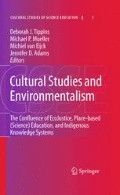Abstract
Chigeza and Whitehouse highlight a significant negotiation indigenous Australian children face each day at school. The bridge between different languages presents a challenge for the students to score well on standardized science assessments. Rather than truly assessing students’ knowledge of science concepts, Chigeza and Whitehouse provide a wealth of evidence, which supports that students may be tested on the mastery of standard Australian English rather than science concepts due to their home language being different than English. Chigeza and Whitehouse recommend that science educators and researchers should develop more appropriate classroom instruction to help students successfully navigate between languages when learning science. Language is highly contextual and as Chigeza and Whitehouse discuss, students are characterized by their language use. Despite their science knowledge, indigenous Australian students are deemed deficient based upon standardized testing scores because of their language.
Access this chapter
Tax calculation will be finalised at checkout
Purchases are for personal use only
References
American Association for the Advancement of Science. (1993). Benchmarks for science literacy. New York: Oxford University Press.
DeBoer, G. E. (1991). A history of ideas in science education: Implications for practice. New York: Teachers College Press.
Kozol, J. (2005). The shame of the nation. New York: Three Rivers Press.
Leonardo, Z. (2007). The war on schools: NCLB, nation creation, and the educational construction of whiteness. Race Ethnicity and Education, 10, 261–278.
Lynch, S. J. (2000). Equity and science education reform. Mahwah: Lawrence Erlbaum.
National Research Council. (1996). National Science Education Standards. Washington, DC: National Academy Press.
Pinar, W. F. (2004). What is curriculum theory? Mahwah: Lawrence Erlbaum.
Sleeter, C. (2005). Un-standardizing curriculum. New York: Teachers College Press.
Author information
Authors and Affiliations
Editor information
Editors and Affiliations
Rights and permissions
Copyright information
© 2010 Springer Netherlands
About this chapter
Cite this chapter
Atkinson, J.L. (2010). Are We Creating the Achievement Gap? Examining How Deficit Mentalities Influence Indigenous Science Curriculum Choices. In: Tippins, D., Mueller, M., van Eijck, M., Adams, J. (eds) Cultural Studies and Environmentalism. Cultural Studies of Science Education, vol 3. Springer, Dordrecht. https://doi.org/10.1007/978-90-481-3929-3_36
Download citation
DOI: https://doi.org/10.1007/978-90-481-3929-3_36
Published:
Publisher Name: Springer, Dordrecht
Print ISBN: 978-90-481-3928-6
Online ISBN: 978-90-481-3929-3
eBook Packages: Humanities, Social Sciences and LawEducation (R0)

